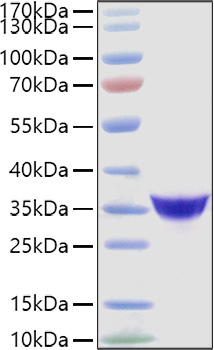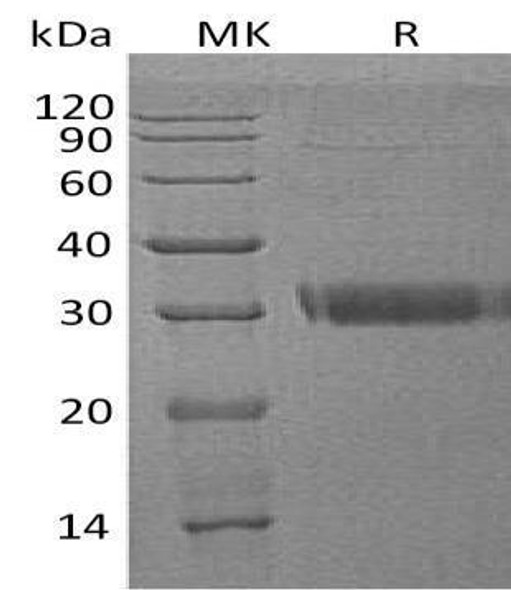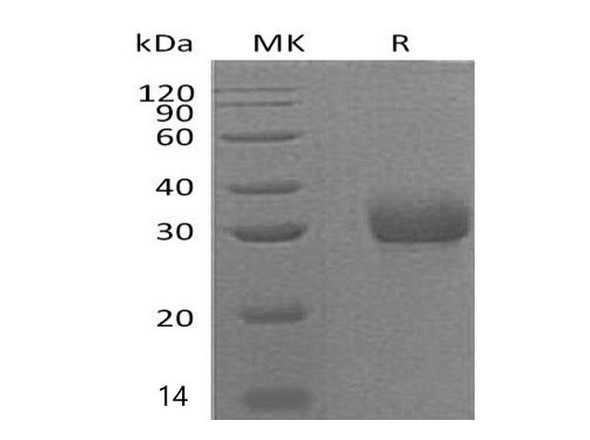Description
Recombinant Human Adiponectin/Acrp30/ADIPOQ Protein
The Recombinant Human Adiponectin/Acrp30/ADIPOQ Protein is a biologically active recombinant protein that plays a significant role in various cellular processes and signaling pathways in human biology. This protein is widely employed in immunological research, cell biology studies, protein-protein interaction analyses, and therapeutic development, providing researchers with a reliable tool for investigating Adiponectin/Acrp30/ADIPOQ function and its implications in health and disease.
This product (SKU: RPCB1183) is produced using HEK293 cells and features a C-His tag for convenient detection and purification. The protein exhibits a calculated molecular weight of 26.38 kDa with an observed molecular weight of 30-38 kDa under denaturing conditions, achieving ≥ 95 % as determined by SDS-PAGE., ensuring exceptional quality and consistency for research applications.
Key Features
| High Purity by Affinity Chromatography | |
| Mammalian & Bacterial Expression Systems | |
| High lot-to-lot consistency via strict QC |
| Product Name: | Recombinant Human Adiponectin/Acrp30/ADIPOQ Protein |
| SKU: | RPCB1183 |
| Size: | 10 μg , 20 μg , 50 μg , 100 μg |
| Reactivity: | Human |
| Synonyms: | ADIPOQ, ACDC, ACRP30, ADIPQTL1, ADPN, APM-1, APM1, GBP28, Adiponectin |
| Tag: | C-His |
| Expression Host: | HEK293 cells |
| Calculated MW: | 26.38 kDa |
| Observed MW: | 30-38 kDa |
| Gene ID: | 9370 |
| Protein Description: | High quality, high purity and low endotoxin recombinant Recombinant Human Adiponectin/Acrp30/ADIPOQ Protein (RPCB1183), tested reactivity in HEK293 cells and has been validated in SDS-PAGE.100% guaranteed. |
| Endotoxin: | < 0.1 EU/μg of the protein by LAL method. |
| Purity: | ≥ 95 % as determined by SDS-PAGE. |
| Formulation: | Lyophilized from a 0.22 μm filtered solution of PBS, pH 7.4. |
| Reconstitution: | Centrifuge the vial before opening. Reconstitute to a concentration of 0.1-0.5 mg/mL in sterile distilled water. Avoid vortex or vigorously pipetting the protein. For long term storage, it is recommended to add a carrier protein or stablizer (e.g. 0.1% BSA, 5% HSA, 10% FBS or 5% Trehalose), and aliquot the reconstituted protein solution to minimize free-thaw cycles. |
| Storage: | Store at -20℃.Store the lyophilized protein at -20℃ to -80 ℃ up to 1 year from the date of receipt. After reconstitution, the protein solution is stable at -20℃ for 3 months, at 2-8℃ for up to 1 week. |
Adiponectin (ADIPOQ), or 30 kDa adipocyte complement-related protein (Acrp30) is a protein secreted by adipose tissue, which acts to reduce insulin resistance and atherogenic damage, but it also exerts actions in other tissues. Adiponectin mediates its actions in the periphery mainly via two receptors, AdipoR1 and AdipoR2. Adiponectin influences gonadotropin release, normal pregnancy, and assisted reproduction outcomes. Adiponectin, a beneficial adipokine, represents a major link between obesity and reproduction. Higher levels of adiponectin are associated with improved menstrual function and better outcomes in assisted reproductive cycles. Unlike other adipocytokines produced by adipose tissue, adiponectin appears to have anti-inflammatory, anti-diabetic, and anti-atherogenic properties. Several clinical studies demonstrate the inverse relationship between plasma adiponectin levels and several inflammatory markers including C-reactive protein. Adiponectin attenuates inflammatory responses to multiple stimuli by modulating signaling pathways in a variety of cell types. The anti-inflammatory properties of adiponectin may be a major component of its beneficial effects on cardiovascular and metabolic disorders including atherosclerosis and insulin resistance. Additionally, it is important factor in chronic liver diseases and chronic kidney diseases. Some cancer cell types express adiponectin receptors. Thus Adiponectin may act on tumour cells directly by binding and activating adiponectin receptors and downstream signalling pathways.







